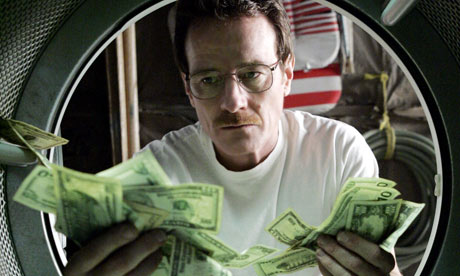The Caravan for Peace challenges the kind of pop-culture therapy that normalises the deadly trade tearing Mexico apart

'The stories of the
orphaned, widowed, displaced, maimed, missing and dead are in
competition with the aesthetic thrills of fictional works like Breaking
Bad.' Photograph: c.AMC/Everett/Rex Features
The American south-west has just witnessed a striking confluence of narratives. As millions of US TV-watchers popped popcorn and tucked in for the latest episode of the hit drug war drama Breaking Bad, the Caravan for Peace drove across Texas telling a different story.
Led by famed poet and journalist Javier Sicilia, the caravan is a fleet of buses, cars andcampervans
travelling 8,000km across the US to show how the war on drugs is
tearing Mexico apart. The goal of this journey, which includes stops in
25 American cities, is to lend a human face to an epidemic of violence
that is all too often portrayed as a one-dimensional conflict between
crime and law enforcement .
It is an ongoing disaster that unfortunately added another collection
of bodies to its dead last weekend, when Mexican authorities discovered 11 corpses along a road in Acapulco.
But it's a tough pitch. The stories being told by Sicilia and the caravan, those of the orphaned, widowed, displaced, maimed, missing and dead, are in competition with the aesthetic thrills of fictional works like Breaking Bad. While it would be unfair to frame Breaking Bad as DEA propaganda or somehow opposed to drug policy reform, its thematic scope fits neatly into the drug warrior's rhetoric of morality and personal choice. In main protagonist Walter White's world, the meth market is occupied by Kierkegaardian anti-heroes with enough agency to decide their own fate. Indeed, his is a world where one's situation is predicated on individual choice, rather than economic determinism.
The premise of Breaking Bad – that a middle-aged, educated white male would wilfully risk his life and the wellbeing of his family to become a crystal meth kingpin is, of course, the stuff of middle-class fantasy. The plausibility of an all-American drug empire has long given way to neoliberal market logic; Mexican cartels have taken over the meth business and are shipping in their precursor chemicals from front companies in China, Africa and Iraq, with lab labour often supplied by abducted migrant workers. It's a highly entertaining fantasy no doubt, but it's also one that crudely uses drug violence as a flat aesthetic background for its comic-book-grade character flourishes. Whether or not the war on drugs is appropriate fodder for guiltless Sunday night entertainment is a matter of personal taste, though it would be difficult to imagine a similarly cartoonish show set in the suburbs of Damascus.
The show is not just apolitical, it's anti-political in that it absolves politics of all responsibility and puts all responsibility on the shoulders of its characters. This makes for good TV, but it ignores the systemic conditions that allow violence to continue. In a recent piece for the Washington Post on hip-hop and the war on drugs, American essayist Touré wrote:
It's the spectacle of America's bloody periphery brought to its doorstep. And above all, the Caravan for Peace demonstrates just how desperately we need a new narrative. One that gives equal screen time to the margins, because that's where most of those affected by drugs live and die.
Led by famed poet and journalist Javier Sicilia, the caravan is a fleet of buses, cars and
But it's a tough pitch. The stories being told by Sicilia and the caravan, those of the orphaned, widowed, displaced, maimed, missing and dead, are in competition with the aesthetic thrills of fictional works like Breaking Bad. While it would be unfair to frame Breaking Bad as DEA propaganda or somehow opposed to drug policy reform, its thematic scope fits neatly into the drug warrior's rhetoric of morality and personal choice. In main protagonist Walter White's world, the meth market is occupied by Kierkegaardian anti-heroes with enough agency to decide their own fate. Indeed, his is a world where one's situation is predicated on individual choice, rather than economic determinism.
The premise of Breaking Bad – that a middle-aged, educated white male would wilfully risk his life and the wellbeing of his family to become a crystal meth kingpin is, of course, the stuff of middle-class fantasy. The plausibility of an all-American drug empire has long given way to neoliberal market logic; Mexican cartels have taken over the meth business and are shipping in their precursor chemicals from front companies in China, Africa and Iraq, with lab labour often supplied by abducted migrant workers. It's a highly entertaining fantasy no doubt, but it's also one that crudely uses drug violence as a flat aesthetic background for its comic-book-grade character flourishes. Whether or not the war on drugs is appropriate fodder for guiltless Sunday night entertainment is a matter of personal taste, though it would be difficult to imagine a similarly cartoonish show set in the suburbs of Damascus.
The show is not just apolitical, it's anti-political in that it absolves politics of all responsibility and puts all responsibility on the shoulders of its characters. This makes for good TV, but it ignores the systemic conditions that allow violence to continue. In a recent piece for the Washington Post on hip-hop and the war on drugs, American essayist Touré wrote:
"When its audience was black, hip-hop embraced black nationalism, Afrocentrism and social consciousness; it was rebellious and almost always anti-drug. After the audience whitened, many MCs embraced criminality and sold the image of the criminalblackman. Black nationalism was out, embodying drug dealers was in. Hip-hop could have grown into a challenge to the war on drugs but instead accepted it as a fact of life and told bluesy, or braggadocious, stories about its part in it."There's something similar going on in Breaking Bad. It's a form of pop-culture therapy that normalises drug violence and helps us to accept what's transpiring on the streets of Mexico and every major North American city as a naturally occurring phenomena. By ignoring the bit players of the war on drugs – those who, regardless of choice, still get sucked in and chewed up – it boils an extremely complex situation down to the sins of the individual. With the Caravan for Peace, we have an antidote to this severely distorted perspective. By touring with a group of people whose lives have been permanently damaged by circumstances beyond their control, Sicilia is offering an alternative interpretation of what the words "drug war" actually mean. A war that isn't really a war at all, but a cacophony of bad policies that has resulted in a relentless human rights disaster.
It's the spectacle of America's bloody periphery brought to its doorstep. And above all, the Caravan for Peace demonstrates just how desperately we need a new narrative. One that gives equal screen time to the margins, because that's where most of those affected by drugs live and die.

No comments:
Post a Comment